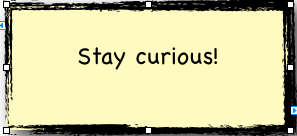Indeed.
I visit curiosity often in these posts. Curiosity--a key communication skill that helps us manage our ki (energy) in times of stress, struggle, and conflict.
One of my favorite curiosity stories was written back in August, 2013: "I'd Actually Have to Be Curious!" I was reminded of the story recently when my husband said: "I'm just curious," and asked me a question like, "What makes you want to do it that way?"
We have learned over our many years together to preface questions in a way that let's the other person know we don't mean to judge or start an argument. We're really just curious. The thing is, often we are judging and would really like to say something different, like, "Why would you EVER do it THAT way?!"
And our history has shown us over and over the unfortunate consequences of such an ill-worded statement, which is what "Why would you EVER do it THAT way?!" really is. It's not a question, is it?
Jim and I were talking about this recently, how the statement "I'm just curious" not only helps the receiver hear the question more easily, it also changes the person asking the question. Because when I say I'm just curious, I change. I engage a different part of my brain and, in fact, become a curious person.
Debate V. Dialogue
There are many charts like this one from The Magic of Dialogue by Daniel Yankelovich that  help us understand the difference between dialogue and debate. A major difference is that when I'm in dialogue, I am curious and seeking information. When I'm debating, I'm stating and proving points.
help us understand the difference between dialogue and debate. A major difference is that when I'm in dialogue, I am curious and seeking information. When I'm debating, I'm stating and proving points.
Today's political landscape offers mostly examples of debate. It seems the more power we have, the more we want to look good, hold our position and win, regardless of the stakes. We rehearse talking points instead of exploring different ways of thinking that might add to our understanding of the problem and help solve it.
A mantra from the field of conflict resolution is, "Be hard on the problem and soft on the people." It's possible to be committed to resolving the issue while simultaneously approaching our problem-solving partners with empathy and curiosity. In my view, it's the only way problems get solved in a sustainable way.
Switching to the Curiosity Channel
Like a physical muscle, curiosity is a mental muscle we can exercise and strengthen. Here are some ways I play with building my curiosity muscle.
I ....
- sit, close my eyes, notice the stillness and become curious about it. I look at specific places in my body that are still--my face, hands, feet--and pay attention.
- think of someone who has vey different ideas and get curious about what makes them think that way.
- imagine the person has come from another planet. What would I ask them that would help me understand their planet and how they view Planet Earth? Sometimes this exercise makes me laugh out loud.
- pay attention to people in a crowd, on a bus, or when I'm driving. I wonder what their lives are like and what they're thinking at this moment. Other humans going about their lives, like me. What a world!
- imagine looking at the world through another person’s eyes. Do they see the same colors as I do? Does the sky look the same to them? Is the grass the same green I see?
- get curious about why I can't be curious. Sometimes it's harder than at other times, and I get curious about myself.
Marine biologist, explorer, author, and the first female chief scientist of NOAA, Sylvia Earle is  quoted as saying, "the best scientists and explorers have the attributes of kids! They ask questions and have a sense of wonder. They have curiosity. 'Who, what, where, why, when, and how!' They never stop asking questions...."
quoted as saying, "the best scientists and explorers have the attributes of kids! They ask questions and have a sense of wonder. They have curiosity. 'Who, what, where, why, when, and how!' They never stop asking questions...."
It wouldn't hurt for all of us to adopt the mindset of a curious five-year-old once in a while. When you're tempted to make a statement, ask a question instead. You might learn something.
Good ki!




Let’s discuss this post in the comments
Note: you don’t need to “log in” or “sign up” to comment. Simply enter your comment, then under the “sign up with Disqus” field enter your name. Then enter your email address and click the checkbox (that will appear) with the label “I’d rather comment as a guest.”